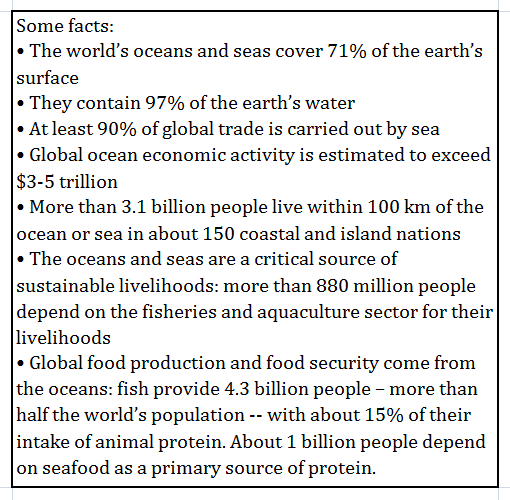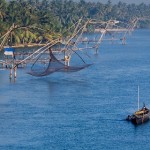This is part of an article series on India in the Global Commons. Click here to read the entire collection.

The oceans and seas have served as a critical and abiding global common. While a major portion of their economic and environmental resources goes beyond national jurisdictions, for centuries sustainable use of ocean resources and the preservation of ocean ecosystems have enabled oceans to remain healthy. But with the demand for these services increasing, the concept of the oceans as a global common has eroded. A first-come first-served approach has replaced it, driven by national and regional interests and increasing competition to secure the economic and commercial opportunities from fisheries, marine transport, mineral exploration and extraction, marine bio-prospecting, ocean energy and coastal and marine tourism – all activities associated with the Blue Economy (BE).
Several factors have led to the decline of the world’s oceans and seas, such as technological advances, overfishing, climate change, pollution, biodiversity and habitat loss, besides inadequate stewardship and law enforcement, according to a recent policy brief put forward to the G20.[1]
These factors affect all countries, but Africa’s 38 coastal states and many other Small Island Developing States (SIDS), in the Caribbean, Pacific and Indian Oceans, are bearing its gravest brunt: livelihoods and the prospects of food security have been decimated and opportunities for longer-term sustainability damaged.
The task at hand – and it’s not an easy one – is to avert a tragedy to this global common by: restoring ocean health, repairing ocean ecosystems and returning to sustainable use of the oceans and seas. In short, by addressing the many factors that have contributed to their decline.
The oceans and seas intrinsically and seamlessly interweave, bringing into contest national, trans-boundary and international boundary and jurisdictional considerations. And achieving practical outcomes that can restore, sustain and protect the oceans as a global common entails navigating through the extraordinary complexity of the global governance of oceans and its intersection with multiple global conventions on biodiversity, climate change and the laws of the sea. This will also call for updating and harmonising many of these conventions. Progress on this front will depend on collective international initiatives, led by the United Nations – and crucially, inspired country leadership.
Historically, India has played a crucial collaborative role in protecting the oceans as a global common. It can now take at least three specific steps to strengthen and revalidate the blue economy as a global common. First, India can help galvanise international action to address the underlying causes of ocean deterioration and the erosion of the oceans as a global common. In developing sustainable fisheries alone, multiple actions can be taken, such as helping scale up and drive forward action in international fora to address illegal, unreported and unregulated fishing (IUU). These can cover: setting up and managing an IUU global vessel database; closing IUU container loopholes; banning blacklisted IUU vessels; establishing IUU as a transnational crime; and prohibiting transshipments at sea.
Second, India can help increase international efforts to support African and other developing countries whose populations are disproportionately dependent on the ocean’s resources, enabling these countries to participate meaningfully in the blue economy.
New initiatives that expand training, skills development, technology and R&D sharing; identify innovative financing for the development of the blue economy; and support the building of regional capacity for action, can support this goal. India can also help identify opportunities for African and SIDS participation in Asian and global value chains in BE sectors.
Finally, India can leverage its presence in several international fora, such as the G20, to promote the oceans as a global common. As the largest member of the 54-country grouping of Commonwealth countries, India can also propose and establish a Commonwealth Blue Economy Innovation hub, to attract, harness and deliver innovative technical and practical support to the poorest, smallest and most vulnerable countries in developing their blue economies and accessing ocean resources.
Leveraging its membership of BRICS, India can also help generate large-scale financial support for infrastructure finance to promote Africa’s blue economy, including blue economy-related port, transport and energy infrastructure.
India’s participation in the Indian Ocean Rim Association (IORA), coupled with South Africa’s chairing of the forum for the next two years, also offers a new collaborative opportunity to develop a long-term strategic partnership for sustainable development of the blue economy by helping integrate IORA’s blue economy objectives and the African Integrated Maritime Strategy (AIMS).
Cyrus Rustomjee is Senior Fellow, Global Economy Program at Centre for International Governance Innovation, Canada.
This is part of an article series on India in the Global Commons. Click here to read the entire collection.
This article was exclusively written for Gateway House: Indian Council on Global Relations. You can read more exclusive content here.
For interview requests with the author, or for permission to republish, please contact outreach@gatewayhouse.in or 022 22023371.
© Copyright 2018 Gateway House: Indian Council on Global Relations. All rights reserved. Any unauthorized copying or reproduction is strictly prohibited.
References
[1] A Sustainable Ocean Economy, Innovation and Growth: A G20 Initiative, Policy Brief No. 113, Centre for International Governance Innovation, at https://www.cigionline.org/publications/sustainable-ocean-economy-innovation-and-growth-g20-initiative


